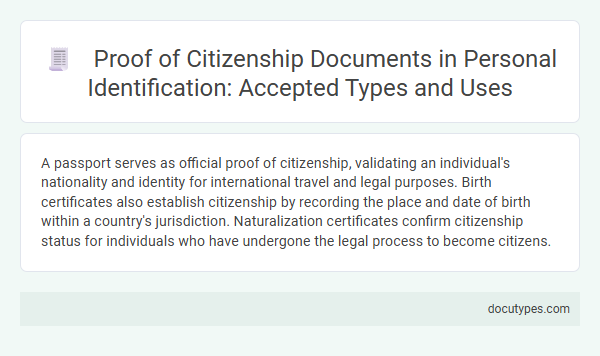A passport serves as official proof of citizenship, validating an individual's nationality and identity for international travel and legal purposes. Birth certificates also establish citizenship by recording the place and date of birth within a country's jurisdiction. Naturalization certificates confirm citizenship status for individuals who have undergone the legal process to become citizens.
Introduction to Proof of Citizenship in Personal Identification
Proof of citizenship is a critical component in establishing personal identification. It serves as an official document verifying an individual's legal nationality within a country.
Documents that serve as official proof of citizenship include birth certificates, passports, and naturalization certificates. These documents are issued by government authorities and contain specific information such as name, date of birth, and citizenship status. Possessing valid proof of citizenship is essential for accessing various rights and services, including voting, employment, and travel.
Importance of Citizenship Documentation
Official proof of citizenship is essential for establishing your legal status within a country. This documentation is required for accessing rights, benefits, and services that only citizens can receive.
- U.S. Passport - A U.S. passport serves as a primary document verifying citizenship at both domestic and international levels.
- Birth Certificate - A certified birth certificate issued by a government authority confirms your birth within the country, establishing citizenship by birthright.
- Naturalization Certificate - This document proves citizenship granted through the naturalization process for those born abroad or to non-citizen parents.
Possessing valid citizenship documentation is crucial for identification, voting, employment, and traveling purposes.
Commonly Accepted Proof of Citizenship Documents
Commonly accepted proof of citizenship documents include a U.S. passport, a birth certificate issued by a state or local government, and a Certificate of Naturalization. These documents verify your status as a citizen and are required for various legal and administrative purposes. Holders should ensure their proof of citizenship is valid and readily accessible for official identification needs.
Primary vs. Secondary Citizenship Documents
| Document Type | Description | Examples | Purpose as Proof of Citizenship |
|---|---|---|---|
| Primary Citizenship Documents | Official documents issued by government authorities serving as direct proof of an individual's citizenship status. | Birth Certificate, Certificate of Naturalization, U.S. Passport, Consular Report of Birth Abroad | Serves as definitive evidence of citizenship, required for official processes such as applying for passports, government benefits, and voter registration. |
| Secondary Citizenship Documents | Supporting documents that provide indirect verification of citizenship when primary documents are unavailable. | State-Issued Identification Cards, Social Security Card, School Records, Immunization Records | Used to complement primary documents or serve as proof when primary documents are lost, but generally not accepted alone for official citizenship verification. |
Passport as Proof of Citizenship
A passport serves as an official proof of citizenship issued by a government authority. It certifies the identity and nationality of the holder for international travel.
Governments use passports to confirm citizenship status and grant access to countries. This document includes personal details, a photograph, and a unique passport number.
Birth Certificate: Role and Requirements
A birth certificate serves as an official proof of citizenship by recording the details of your birth, including the location and parents' information. This document is issued by government authorities and is essential for establishing identity and citizenship status in legal and administrative processes. To be valid, a birth certificate must include specific information such as the full name, date of birth, place of birth, and official seals or signatures.
Naturalization and Citizenship Certificates
The primary document serving as official proof of citizenship in the United States is the Naturalization Certificate. This certificate is issued to foreign-born individuals who have successfully completed the naturalization process.
Another key document is the Citizenship Certificate, which is provided to individuals who derive citizenship through parents or other specific conditions. Both certificates serve as legal evidence of U.S. citizenship for identification and legal purposes.
Uses of Citizenship Documents in Legal Processes
What document serves as official proof of citizenship? A birth certificate, passport, or naturalization certificate commonly acts as official proof of citizenship. These documents are essential in legal processes such as applying for a government job, obtaining a state or federal ID, and proving eligibility for social services.
Challenges in Obtaining and Presenting Citizenship Proof
The most common document serving as official proof of citizenship is a birth certificate or a naturalization certificate. Obtaining and presenting these documents can be complicated due to varying requirements and bureaucratic delays.
- Document Availability - Access to original birth or naturalization certificates may be restricted or lost over time, causing difficulties in proving citizenship.
- Verification Challenges - Some institutions have strict standards for document authenticity, leading to rejections or additional verification steps.
- Legal and Administrative Barriers - Complex processes and differing regulations across jurisdictions can delay or prevent you from securing acceptable proof of citizenship.
What Document Serves as Official Proof of Citizenship? Infographic

